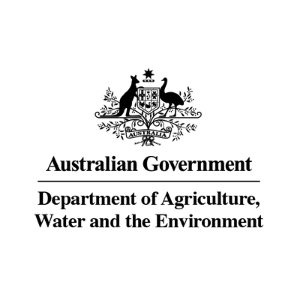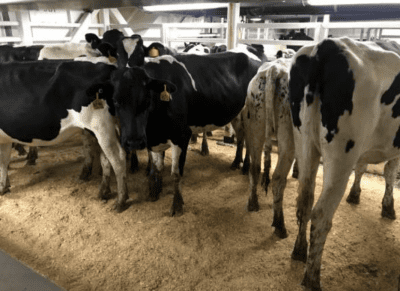A LIVESTOCK exporter has received a reprimand from the Department of Agriculture, Water and Environment for failing to ensure cattle assembled for a shipment to China last year were sourced in accordance with the importing country’s requirements.
 In August 2019 the Department blocked a shipment of dairy heifers from being exported as the cattle were being loaded by Australasian Global Exports (AGE) in Portland for China.
In August 2019 the Department blocked a shipment of dairy heifers from being exported as the cattle were being loaded by Australasian Global Exports (AGE) in Portland for China.
It is understood – but not confirmed by the Federal or Victorian Department of Agriculture – that the Department acted after receiving an anonymous tip that some of the cattle in the consignment had falsified NLIS tags.
Both Departments have declined to comment directly on allegations a cattle producer has since admitted to replacing NLIS tags on a consignment of cattle sold into the shipment, citing privacy reasons and a policy of “not commenting on individual investigations”.
But both reinforced the high level of responsibility that the regulatory system places on exporters to ensure no stone is left unturned in confirming the true biosecurity status of all livestock they source for export.
The Federal Department said its decision to block the shipment last year reflected its commitment “to ensuring that only agricultural commodities which have been sourced and prepared in accordance with the importing country requirements and all other regulatory requirements are exported from Australia”.
The Department noted that the irregularities it found related to one particular consignment of cattle and it found no evidence of any broader issue with consignments that have been exported or are undergoing preparation for export to China or elsewhere.
The Department’s order to halt the consignment as it was being loaded in Portland last August is estimated to have cost the exporter involved, Australasian Global Exports, some millions of dollars.
This includes the losses incurred through forced additional demurrage fees, extended feeding costs before the dairy heifers could be resold domestically, and the significant reduction in their sale value, as they could no longer be sold into the higher-priced export market for which they had been purchased by the exporter.

Dairy heifers on a livestock ship (not part of the shipment referred to in article). Image source: Department of Agriculture, Water and Environment Independent Observer report, December 2019.
After a 10-month investigation into the sourcing and preparation of cattle for the export shipment, the Department has posted a statement outlining the outcome on an internal page on its website.
The statement (which is published in full below) provides limited details on why the shipment was blocked, and makes no reference to NLIS tags.
It says the Department was not satisfied that the AGE consignment met the importing country requirements and its investigation found that at the time of sourcing the consignment, AGE did not have sufficient systems or controls in place to ensure that livestock sourced for export met the importing country requirements.
“At the time, AGE was not able to identify and address irregularities in the timelines relating to the collection, and submission for testing, of blood samples from livestock in the consignment.”
The Department said this was found to be a breach of AGE’s license conditions which require that livestock are sourced in accordance with the importing country requirements.
The Department said it had taken into account representations and information provided by AGE as to the additional procedures it had implemented in response to the identified irregularities to ensure that it detects and prevents any further irregularities in its sourcing of livestock for export.
In response to a request for a comment a representative of AGE said the company did not wish to make a statement at this point.
Beef Central has made a number of inquiries seeking to gain a deeper understanding of the events that led to the shipment being cancelled.
It has to be emphasised that none of these claims have been officially confirmed or verified but discussions with people understood to be familiar with the events have alleged that a cattle producer had told investigators he had replaced NLIS tags on some of the cattle before they were sold to the shipment.
It has also been alleged some of the cattle on the cancelled shipment were previously offered a few months earlier to another exporter, but were rejected by that exporter after they failed an IBR (Infectious Bovine Rhinotracheitis) test. It is alleged the Department investigated the AGE shipment after receiving an anonymous tip that some of the cattle in its shipment assembled for China may have carried falsified tags.
Beef Central asked the Department if any other parties beyond the exporter had been investigated as part of this case and whether any other penalties were, or may yet be, applied.
In response a representative said the department “does not comment on individual investigations”, and said any questions about NLIS tags should be referred to the Victorian Government.
An Agriculture Victoria spokesperson told Beef Central that it “has concluded the investigation into this matter”.
“We are unable to comment further on the outcome of the investigation due to privacy reasons,” the spokesperson said in a written statement.
The statement added that the National Livestock Identification System (NLIS) underpins and protects Victoria’s livestock industry as a supplier of safe food, and everyone across the supply chain has a responsibility under the system – from ensuring livestock are correctly tagged, to recording livestock movements accurately, and completing paperwork correctly when livestock are moved.
It also noted that failing to record or inaccurate recording of livestock movements could jeopardise important export markets.
All cattle, sheep, goats and pigs bought and sold along the supply chain, must remain tagged with an NLIS-accredited tag or device. It said offences for removing NLIS tags from prescribed livestock attracts a fine of $484 or, if taken to court, a penalty of up to $9900 may be imposed.
Livestock exports are a significant market for Victoria’s livestock sector, worth $362 million in trade in 2018-19.
Both Departments reinforced the message that it remains the responsibility of exporters to ensure agricultural commodities are sourced and prepared in accordance with the importing country requirements.
“The Australian trade relies on exporters to have effective systems, management structures and oversight of its employees and contractors for ensuring the importing country requirements are met,” the DAWE statement said.
One live export trade source made the point to Beef Central that had the investigation not occurred “non-compliant cattle would have been sent to China”.
Some live exporters have faced severe punishments in the past for biosecurity compliance failures.
In 2016 the Department of Agriculture cancelled the license of Frontier’s southern livestock exporting business after its investigation found ‘certain preparation and isolation procedures within the supply chain’ were not adequately followed, which led to Australian dairy heifers later testing positive to BJD upon arrival in Japan, triggering the suspension of that trade for some months.
DAWE statement:
Reprimand issued to Australasian Global Exports Pty Ltd
The Department of Agriculture, Water and the Environment (Department) has issued a reprimand to the licensed livestock exporter Australasian Global Exports Pty Ltd (AGE). This action follows an investigation into the sourcing and preparation of a consignment of livestock for export to the People’s Republic of China in August 2019.
The Department was not satisfied that the AGE consignment met the importing country requirements and took immediate action to stop the export in 2019 when issues came to the Department’s attention.
The Department found that at the time of sourcing the consignment, AGE did not have sufficient systems or controls in place to ensure that livestock sourced for export met the importing country requirements.
At the time, AGE was not able to identify and address irregularities in the timelines relating to the collection, and submission for testing, of blood samples from livestock in the consignment.
The Department found AGE’s failure to ensure that the livestock were sourced in accordance with the importing country requirements to be a breach of AGE’s licence conditions and issued a reprimand in accordance with the requirements of the Australian Meat and Livestock Industry Act 1997.
In making its decision, the Department took into account the representations and information provided by AGE as to the additional procedures it had implemented in response to the identified irregularities to ensure that it detects and prevents any further irregularities in its sourcing of livestock for export.
The irregularities identified by the Department are specific to the particular consignment referred to above.
The Department has found no evidence of any broader issue with consignments that have been exported or are undergoing preparation for export to China or elsewhere.
The Department has confidence in Australia’s regulatory systems to ensure that consignments of livestock continue to be sourced, prepared and exported in compliance with the relevant import conditions of Australia’s trading partners.
However, it is the responsibility of each exporter to ensure that agricultural commodities are sourced and prepared in accordance with the importing country requirements.
The Australian trade relies on exporters to have effective systems, management structures and oversight of its employees and contractors for ensuring the importing country requirements are met.
This decision demonstrates the Department’s absolute commitment to ensuring that only agricultural commodities which have been sourced and prepared in accordance with the importing country requirements and all other regulatory requirements are exported from Australia.
